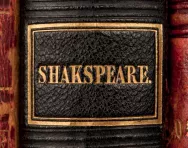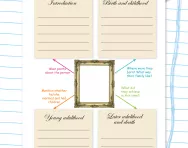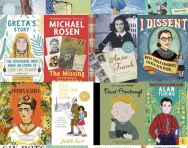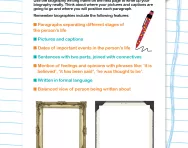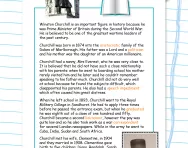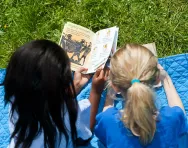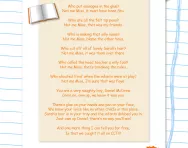Important update from TheSchoolRun
For the past 13 years, TheSchoolRun has been run by a small team of mums working from home, dedicated to providing quality educational resources to primary school parents. Unfortunately, rising supplier costs and falling revenue have made it impossible for us to continue operating, and we’ve had to make the difficult decision to close. The good news: We’ve arranged for another educational provider to take over many of our resources. These will be hosted on a new portal, where the content will be updated and expanded to support your child’s learning.
What this means for subscribers:
- Your subscription is still active, and for now, you can keep using the website as normal — just log in with your usual details to access all our articles and resources*.
- In a few months, all resources will move to the new portal. You’ll continue to have access there until your subscription ends. We’ll send you full details nearer the time.
- As a thank you for your support, we’ll also be sending you 16 primary school eBooks (worth £108.84) to download and keep.
A few changes to be aware of:
- The Learning Journey weekly email has ended, but your child’s plan will still be updated on your dashboard each Monday. Just log in to see the recommended worksheets.
- The 11+ weekly emails have now ended. We sent you all the remaining emails in the series at the end of March — please check your inbox (and spam folder) if you haven’t seen them. You can also follow the full programme here: 11+ Learning Journey.
If you have any questions, please contact us at [email protected]. Thank you for being part of our journey it’s been a privilege to support your family’s learning.
*If you need to reset your password, it will still work as usual. Please check your spam folder if the reset email doesn’t appear in your inbox.
Interviewing to write a biography

How well do your children know the biographical details of your life, or their grandparents'? Do you yourself know how family friends met their partners, what their favourite subject was at school or what their first job was?
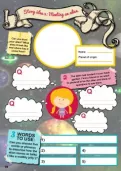
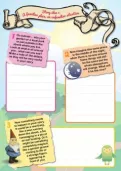
Download a FREE Creative Writing toolkit!
- KS1 & KS2 workbooks
- Bursting with fill-in prompt sheets and inspiring ideas
- Story structure tips, style guides and editing suggestions
Help your child learn about the features of biographical text by encouraging them to interview family members, friends and neighbours and write up their findings as a biography.
The interviews don't need to take place face-to-face, but they will reinforce the bonds between your child and the important adults in their life (plus everyone likes to discuss their favourite sweet from their childhood or why they loved or loathed one of their teachers!).
If your child is interviewing a grandparent or older adult, here are a few questions they might like to ask (they can be adapted for different ages and stages). They might like to take notes during their conversation, or record a video or phone call to listen to later and work from.
- Where and when were you born?
- How did your parents choose your name? Did you have any childhood nicknames, or did you have nicknames which particular groups of people in your life used, like your family or school friends or work colleagues?
- Where did you grow up? Did you live in one house or different places?
- What schools did you go to? Were they close or far away, and which was your favourite? Do you remember any teachers you loved (or hated!)?
- What was your favourite subject at school?
- Did you learn anything off by heart, like a poem or your times tables, that you still use today?
- Did your family have any pets?
- Did you have a favourite book or TV series?
- Who were your best friends growing up and what did you like to do together?
- What were your favourite snack, meal, pudding and drink?
- Did you have any family traditions?
- What did you want to be when you grew up?
- What was your favourite family holiday and why was it great?
- Did you play any sports at school, or go to any after-school clubs or classes?
- After you finished school did you start working or go to university?
- What was your first job?
- During your adult life have you lived in different places?
- How did you meet Grandma / Grandpa? Can you remember when you first saw them?
- How did you get engaged to be married or start living together?
- What was your favourite age to be, and why?
- What are you most proud to have done in your life?
You can download some decorated templates with questions for the World's Best Grandma or queries for a Brilliant Grandpa from Ohio Health.
They can also get some interview tips from journalist Nelufar Hedayat:
Writing a biography resources
When it comes to writing up all the facts they've learned, your child will need to take notes and then plan their writing.
Biography subjects are usually famous people like scientists, entertainers, explorers, artists or campaigners. Some of the famous people covered in the primary curriculum, which your child might enjoy researching and writing about, are: Archimedes, Julius Caesar, Boudica, Alfred the Great, King Henry VIII, Queen Elizabeth I, Sir Francis Drake, William Shakespeare, Mary Queen of Scots, Christopher Columbus, Leonardo Da Vinci, Galileo Galilei, Guy Fawkes, Robert Hooke, Sir Isaac Newton, Lord Nelson, the Duke of Wellington, Queen Victoria, Florence Nightingale, Mary Seacole, Isambard Kingdom Brunel, George Stephenson, Dr Edward Jenner, Mary Anning, the Wright brothers, Thomas Edison, Winston Churchill, Anne Frank, Queen Elizabeth II, Albert Einstein, Dr Martin Luther King, Nelson Mandela.
They might also like to complete some extra biography-writing tasks with a non-fiction Biography Writing resource pack from Puffin Books.



